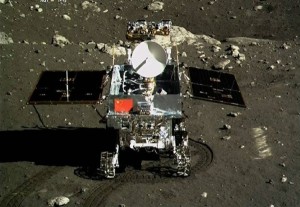
Chinese Rover Yutu on Moons Surface
China has greatly advanced their space program by soft-landing a spacecraft and rover on the moon. This is a significant step towards placing men on the moon for the first time since the USA abandoned its Apollo moon exploration program in the 1970’s the result of financial pressures created by the Vietnam war and the War-on-Poverty.
I don’t know about you, but I find the news of a Chinese moon landing to be bittersweet. I am pleased that the Chinese are inspired to develop the technology to put men on the moon, but I’m am disappointed that we (the US) have placed our space exploration aspirations on the back burner and now find ourselves in the position of having to pay Russia to transport our astronauts to the International Space Station with a replacement for the Space Shuttle still years away.
During the 1960s, the America’s space program was my inspiration to study engineering. From the the 8th grade on, I knew I wanted to be an engineer. I graduated from high school in 1966 and started my engineering studies at Purdue University that fall. While I was studying Mechanical Engineering at Purdue several of my professors had worked on various aspects of the Gemini and Apollo programs. Some of our homework assignments even dealt with design aspects of the Apollo program.
Unfortunately, by the time I received my mechanical engineering in 1970 the US was drastically scaling back spending on space exploration. Therefore, I didn’t get a chance to work on the space program when I graduated. By the time NASA received the funding to move forward with the Space Shuttle and International Space Station I was already well entrenched in my career at Carrier Corporation (a Division of United Technologies).
I know I was not the only engineering or science student at Purdue that had been inspired by the US space program. The same thing that inspired me and tens of thousands of others to pursue degrees in science and engineering is now happening in China. Hundreds of thousands of Chinese school children will one day graduate with engineering or science degrees because they were galvanized by seeing their Lunar Rover, Yutu, exploring the surface of the moon.
What is our country doing to inspire the next generation of scientists and engineer? I fear we are not doing enough. Have we lost our ability to dream? Are we doing an injustice to our children and grand children by not having a realistic strategic plan for space exploration? It seems that NASA funding moves up and down with the whims of the politically elite in Washington. They seem more focused on spending tax dollars to buy votes than they are on maintaining our technological leadership. A couple of bright spots in our current space program are the Hubble space telescope and the Mars Science Laboratory, Curiosity, both which were planned over a decade ago, but I don’t believe we are doing enough now to capture the imaginations of our young people.
We need to find some way to get our kids and grand kids away from their video games, text messaging, cell phones and the non-redeeming entertainment from Hollywood and motivate them to dream, explore and design new things.
 Perhaps a legitimate NASA space program could help to capture the imaginations of the next generation of US scientists and engineers. Otherwise, I fear that in the near future we will just become the consumers of technology generated by China, India and other developing countries which understand that their future depends on motivating their young people to pursue technical degrees which ultimately benefit their entire population. All one has to do is visit China to see the significant impact this approach has been having on their country over the last two decades.
Perhaps a legitimate NASA space program could help to capture the imaginations of the next generation of US scientists and engineers. Otherwise, I fear that in the near future we will just become the consumers of technology generated by China, India and other developing countries which understand that their future depends on motivating their young people to pursue technical degrees which ultimately benefit their entire population. All one has to do is visit China to see the significant impact this approach has been having on their country over the last two decades.
Just my thoughts,
Fred, KC9QQ




